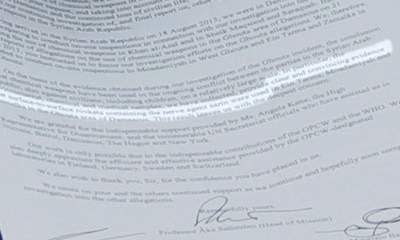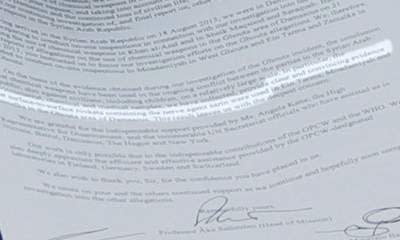Syria: UN Probing 14 Alleged Gas Attacks
The head of a UN panel on war crimes in Syria has revealed it is investigating 14 suspected chemical attacks, as a report appeared to show "clear evidence" of their use.
UN Commission chairman Paulo Sergio Pinheiro said the Geneva-based probe had not yet determined the exact materials used but was awaiting evidence from a separate team of chemical weapons inspectors whose findings are expected to be made public later.
A photograph of that report appeared to show the first page which revealed "clear and convincing evidence that surface-to-surface rockets containing the nerve agent Sarin were used".
"The conclusion is that chemical weapons have been used in the ongoing conflict between the parties in the Syrian Arab Republic ... against civilians including children on a relatively large scale," the inspectors said.
The inspection team was tasked with determining whether chemical weapons were used in an attack in the suburbs of Damascus on August 21, which the US says killed at least 1,400 people.
Their findings, they said, were taken from samples they collected in the Ghouta area of Damascus.
Sky's Foreign Affairs Editor Tim Marshall said: "I assume that the UN report will go on talk about the type of weapon that was used.
"Other people will say, 'well only one side had the ability to do that'."
Their report will reveal which chemical agents were used, but will not make a judgement on who was responsible.
Details of the report are due to be presented in New York by UN Secretary-General Ban Ki-moon.
At his news conference, Mr Pinheiro stressed that the "vast majority" of casualties of the conflict had been killed by conventional weapons such as guns and mortars.
He added that the Commission believed that President Bashar al Assad's government had committed war crimes and crimes against humanity, while rebel groups had perpetrated war crimes but not crimes against humanity because there was "not a clear chain of command".
The developments came as British Foreign Secretary William Hague met with his French counterpart Lauren Fabius and US Secretary of State John Kerry in Paris to discuss the Syrian chemical weapons handover hammered out by the US and Russia.
Mr Kerry warned Mr Assad the allies would "not tolerate anything less than full compliance" with the agreement.
The accord offered the Syrian leader "no lifeline" and he had "lost all legitimacy", Mr Kerry added.
They want the agreed framework to be put into a "strong and binding" UN resolution, under Chapter 7 of the UN Charter, which can authorise both the use of force and non-military action.
However, Russia's understanding of the deal reached with the US in Geneva appears to be at odds with that of the Western allies, in that it believes a military option should only be on the table in the event of non-compliance from Syria.
Russian Foreign Minister Sergei Lavrov immediately cautioned against imposing tough penalties on Mr Assad, warning that a threatening UN resolution may "wreck peace talks".

 Yahoo News
Yahoo News 

